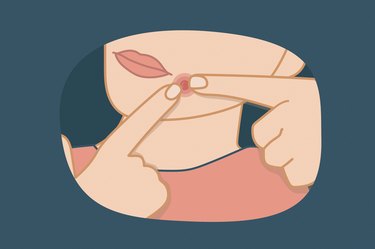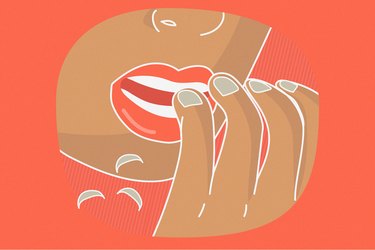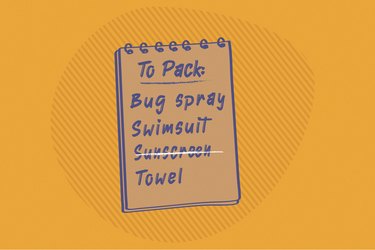
Admit it: There's something strangely satisfying about zapping a zit. Yep, popping a pimple or a big blackhead is tempting, but any dermatologist will tell you that squeezing your skin is a bad idea.
The issue is, popping won't necessarily get rid of your pimple problem. In fact, picking at your face may just make things worse.
Video of the Day
Video of the Day
Here, Y. Claire Chang, MD, a board-certified dermatologist at Union Square Laser Dermatology, shares what can go wrong when you take your skin into your own hands and offers tips on how to pop pimples safely.
1. You Might End Up With More Redness and Swelling
"Popping, picking and manipulating a pimple can irritate it and cause it to rupture under the skin," Dr. Chang says. "This often triggers an inflammatory response and results in more redness and swelling."
In other words, breaking open your blemish can make it bigger (read: more noticeable) and may lengthen the time it takes your lesion to clear up. Which is, we're betting, the opposite of what you want.
2. You Could Get an Infection
Popping a pimple can cause trauma to the skin, which can create an entryway for bad bacteria, Dr. Chang says. Once the bacteria pass through the portal of broken skin, they can worsen inflammation or initiate an infection, she says.
While less common, in severe cases, this can even lead to an abscess (a painful pocket of pus) or cellulitis (a bacterial skin infection that causes a swollen, red rash that's warm to the touch), Dr. Chang says.
In fact, if left untreated, a cellulitis infection can travel to your lymph nodes and bloodstream, which may potentially become life-threatening and require immediate medical assistance, according to the Mayo Clinic.
3. It Can Cause Scarring
The whole premise behind popping a pimple is to make it go away quicker. But, ironically, picking at your pustule may leave a long-lasting mark.
"Popping a pimple worsens inflammation and increases the likelihood of acne scarring," Dr. Chang says.
Here's why: Inflammation can break down collagen and trigger more pigment production in the skin, she explains. This process produces atrophic acne scars and post-inflammatory hyperpigmentation (darkened patches or spots on the skin).
What to Do Instead of Popping
1. Try Topicals
To avoid these unwanted side effects, do away with the do-it-yourself pimple popping. "Rather, stick to acne medications and topicals that will help prevent and treat acne," Dr. Chang says. "Topicals containing benzoyl peroxide and salicylic acid can help calm down inflammation and reduce acne lesions."
Products with benzoyl peroxide include Neutrogena Rapid Clear Stubborn Acne Spot Treatment ($6.87, Amazon.com) and La Roche-Posay Effaclar Duo Dual Action Acne Treatment ($19.99, Amazon.com).
Topicals with salicylic acid include CeraVe Acne Control Gel ($15.99, Amazon.com) and Clean & Clear Advantage Acne Spot Treatment ($6.68, Walmart.com).
And if you find it hard to resist picking at a pustule, apply a pimple patch on the spot to stop yourself from touching it, she adds. Try Peace Out Acne Dots ($19 for 20, PeaceOutSkinCare.com)
2. See a Dermatologist
If pimples are a persistent problem, you should see a board-certified dermatologist who can assess your skin situation and discuss your options, Dr. Chang says.
In addition to prescribing acne-fighting medicines, dermatologists may also employ a few strategies to safely pop a pimple, such as the following techniques, per the American Academy of Dermatology Association:
- Acne extraction: A doctor uses sterile instruments to remove blackheads and whiteheads.
- Corticosteroids: A doctor injects a pimple with a corticosteroid, which speeds the healing process of deep, painful acne cysts or nodules and reduces the risk of scarring.
- Incision and drainage: A doctor uses a sterile needle or surgical blade to cut open a pimple, cyst or nodule and drain its contents.
Related Reading
But if You Insist on Popping Pimples at Home…
While Dr. Chang — and every dermatologist who ever lived — strongly discourages squeezing your own pimples, there is a safer way to do it if you simply can't resist the urge. Follow these steps, courtesy of Dr. Chang, to reduce your risk of causing trauma to the skin, infection and scarring.
How to Pop a Pimple
- Wash your hands. Always suds up with soap and water before touching your skin. This will lower the chances of dirt, debris or bacteria entering your skin and causing an infection. If you're using a comedone extractor ($4.99, Amazon.com) — a handheld tool with a hollow circle at the end that's specifically designed to remove blackheads and whiteheads — make sure to sterilize your instrument as well.
- Apply a warm compress (or take a warm shower) beforehand. This helps soften and prep the skin for extraction.
- Using a clean tissue, gently press the skin around the pimple. Never use your nails to squeeze. This can inadvertently scratch the skin's surface, creating a convenient entrance for infection-causing bacteria.
- Don't apply too much pressure. If you're trying to pop a pimple, but it does not express with gentle pressure, it is likely too deep and should not be popped aggressively. Forceful pressure will contribute to increased inflammation and redness.
- Apply a dab of a topical antibiotic cream, such as Neosporin ($3.89, Amazon.com). This will help you avoid infection in the area.
So, How Bad Is It Really to Pop Pimples?
Often, the key to clearer skin is patience. Over-the-counter acne products and prescription medications take time to work.
But if you want to banish a blemish faster, it's always better to see your dermatologist, Dr. Chang says. Proper pimple popping is an art, and unless you have the right training, you run the risk of making your marks worse.
Moral of the story: Save the squeezing for the experts.
Is this an emergency? If you are experiencing serious medical symptoms, please see the National Library of Medicine’s list of signs you need emergency medical attention or call 911.



